The Role of Reflective Learning in Improving Assessments
VerifiedAdded on 2023/06/11
|9
|1942
|480
Essay
AI Summary
This essay delves into the significance of reflective learning, emphasizing its role in developing critical thinking and self-awareness. It employs Gibbs' reflective cycle to analyze experiences, feelings, evaluations, and action plans, highlighting how this approach enhances learning. The essay also explores the nature of feedback and feed-forward, demonstrating how they inform and improve formative and summative assessments. By integrating reflective practices, learners can identify areas for improvement, utilize feedback effectively, and proactively enhance their future performance. The combination of feedback and feed-forward plays a significant role in the context of individuals person or professional growth in the competitive world, where each person attempt to succeed and grab all the existing opportunities that are available. Reflective approach is very useful to inform the need of improvement to both summative and formative assessment.
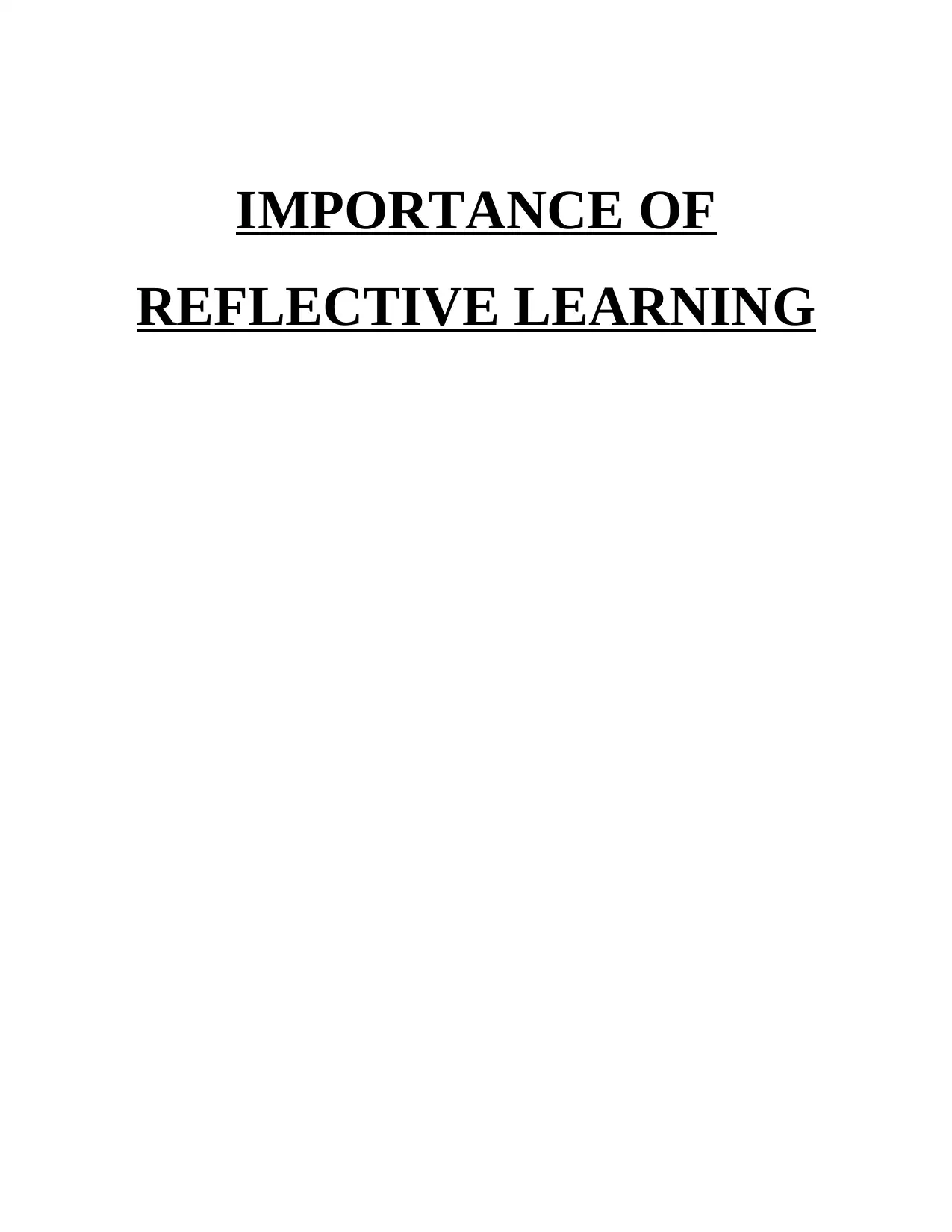
IMPORTANCE OF
REFLECTIVE LEARNING
REFLECTIVE LEARNING
Paraphrase This Document
Need a fresh take? Get an instant paraphrase of this document with our AI Paraphraser
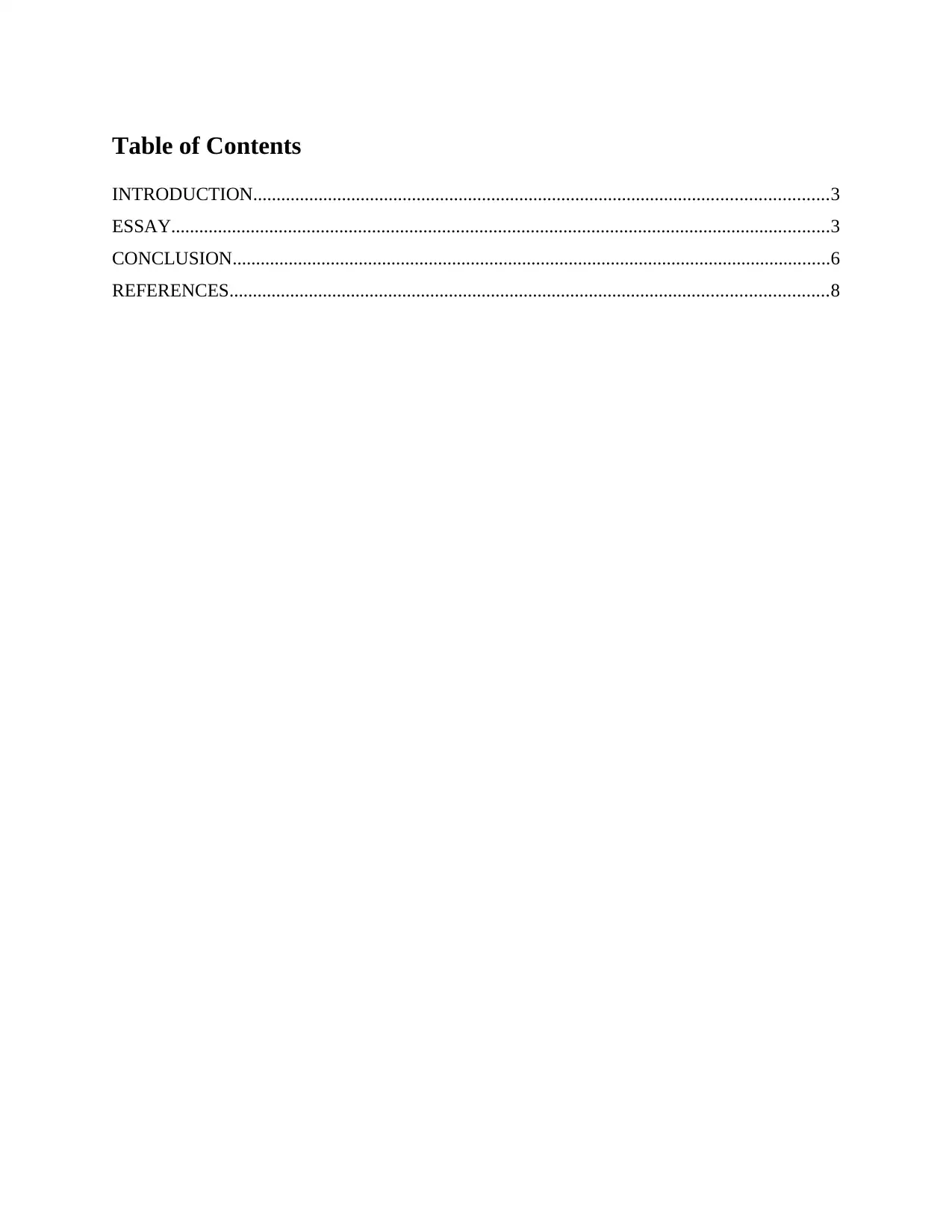
Table of Contents
INTRODUCTION...........................................................................................................................3
ESSAY.............................................................................................................................................3
CONCLUSION................................................................................................................................6
REFERENCES................................................................................................................................8
INTRODUCTION...........................................................................................................................3
ESSAY.............................................................................................................................................3
CONCLUSION................................................................................................................................6
REFERENCES................................................................................................................................8
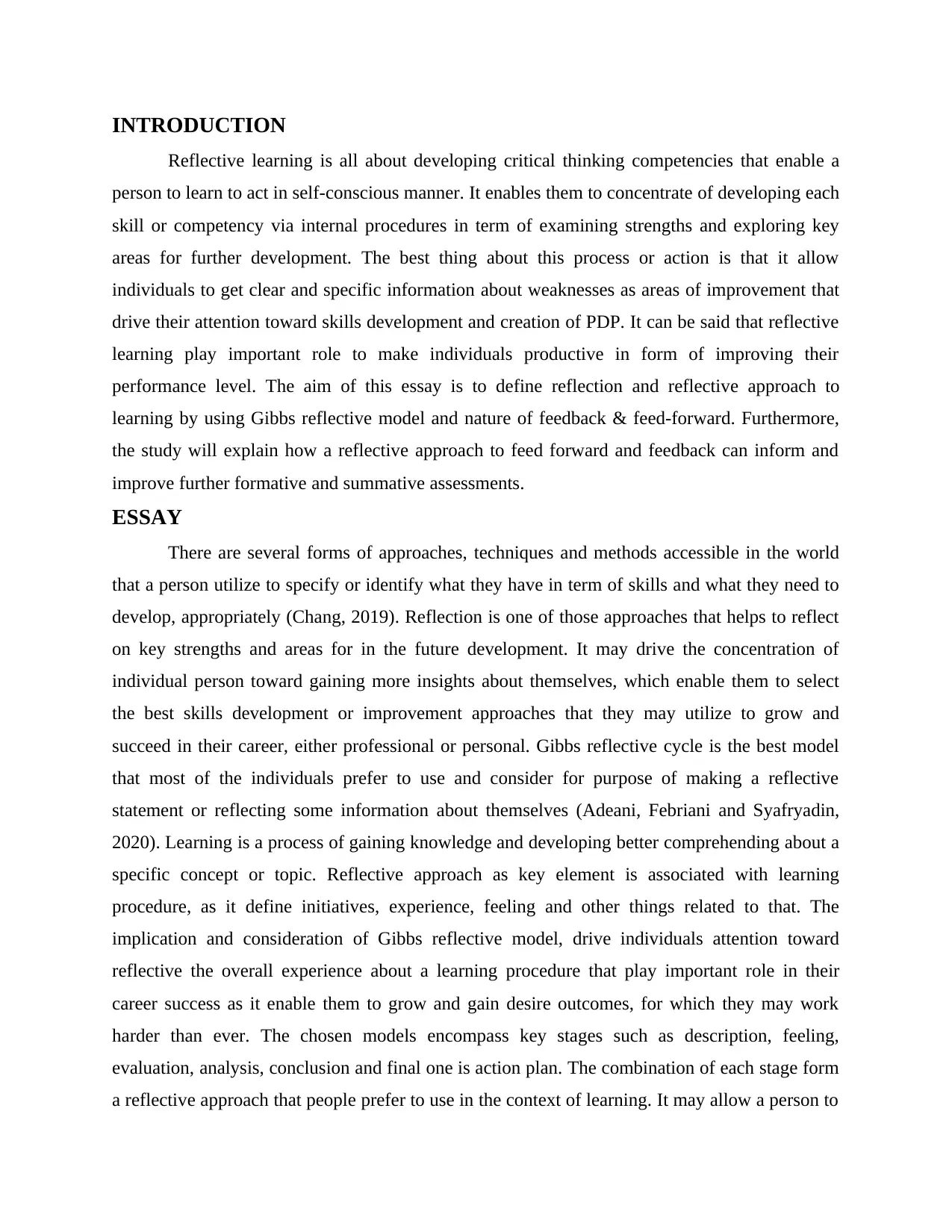
INTRODUCTION
Reflective learning is all about developing critical thinking competencies that enable a
person to learn to act in self-conscious manner. It enables them to concentrate of developing each
skill or competency via internal procedures in term of examining strengths and exploring key
areas for further development. The best thing about this process or action is that it allow
individuals to get clear and specific information about weaknesses as areas of improvement that
drive their attention toward skills development and creation of PDP. It can be said that reflective
learning play important role to make individuals productive in form of improving their
performance level. The aim of this essay is to define reflection and reflective approach to
learning by using Gibbs reflective model and nature of feedback & feed-forward. Furthermore,
the study will explain how a reflective approach to feed forward and feedback can inform and
improve further formative and summative assessments.
ESSAY
There are several forms of approaches, techniques and methods accessible in the world
that a person utilize to specify or identify what they have in term of skills and what they need to
develop, appropriately (Chang, 2019). Reflection is one of those approaches that helps to reflect
on key strengths and areas for in the future development. It may drive the concentration of
individual person toward gaining more insights about themselves, which enable them to select
the best skills development or improvement approaches that they may utilize to grow and
succeed in their career, either professional or personal. Gibbs reflective cycle is the best model
that most of the individuals prefer to use and consider for purpose of making a reflective
statement or reflecting some information about themselves (Adeani, Febriani and Syafryadin,
2020). Learning is a process of gaining knowledge and developing better comprehending about a
specific concept or topic. Reflective approach as key element is associated with learning
procedure, as it define initiatives, experience, feeling and other things related to that. The
implication and consideration of Gibbs reflective model, drive individuals attention toward
reflective the overall experience about a learning procedure that play important role in their
career success as it enable them to grow and gain desire outcomes, for which they may work
harder than ever. The chosen models encompass key stages such as description, feeling,
evaluation, analysis, conclusion and final one is action plan. The combination of each stage form
a reflective approach that people prefer to use in the context of learning. It may allow a person to
Reflective learning is all about developing critical thinking competencies that enable a
person to learn to act in self-conscious manner. It enables them to concentrate of developing each
skill or competency via internal procedures in term of examining strengths and exploring key
areas for further development. The best thing about this process or action is that it allow
individuals to get clear and specific information about weaknesses as areas of improvement that
drive their attention toward skills development and creation of PDP. It can be said that reflective
learning play important role to make individuals productive in form of improving their
performance level. The aim of this essay is to define reflection and reflective approach to
learning by using Gibbs reflective model and nature of feedback & feed-forward. Furthermore,
the study will explain how a reflective approach to feed forward and feedback can inform and
improve further formative and summative assessments.
ESSAY
There are several forms of approaches, techniques and methods accessible in the world
that a person utilize to specify or identify what they have in term of skills and what they need to
develop, appropriately (Chang, 2019). Reflection is one of those approaches that helps to reflect
on key strengths and areas for in the future development. It may drive the concentration of
individual person toward gaining more insights about themselves, which enable them to select
the best skills development or improvement approaches that they may utilize to grow and
succeed in their career, either professional or personal. Gibbs reflective cycle is the best model
that most of the individuals prefer to use and consider for purpose of making a reflective
statement or reflecting some information about themselves (Adeani, Febriani and Syafryadin,
2020). Learning is a process of gaining knowledge and developing better comprehending about a
specific concept or topic. Reflective approach as key element is associated with learning
procedure, as it define initiatives, experience, feeling and other things related to that. The
implication and consideration of Gibbs reflective model, drive individuals attention toward
reflective the overall experience about a learning procedure that play important role in their
career success as it enable them to grow and gain desire outcomes, for which they may work
harder than ever. The chosen models encompass key stages such as description, feeling,
evaluation, analysis, conclusion and final one is action plan. The combination of each stage form
a reflective approach that people prefer to use in the context of learning. It may allow a person to
⊘ This is a preview!⊘
Do you want full access?
Subscribe today to unlock all pages.

Trusted by 1+ million students worldwide
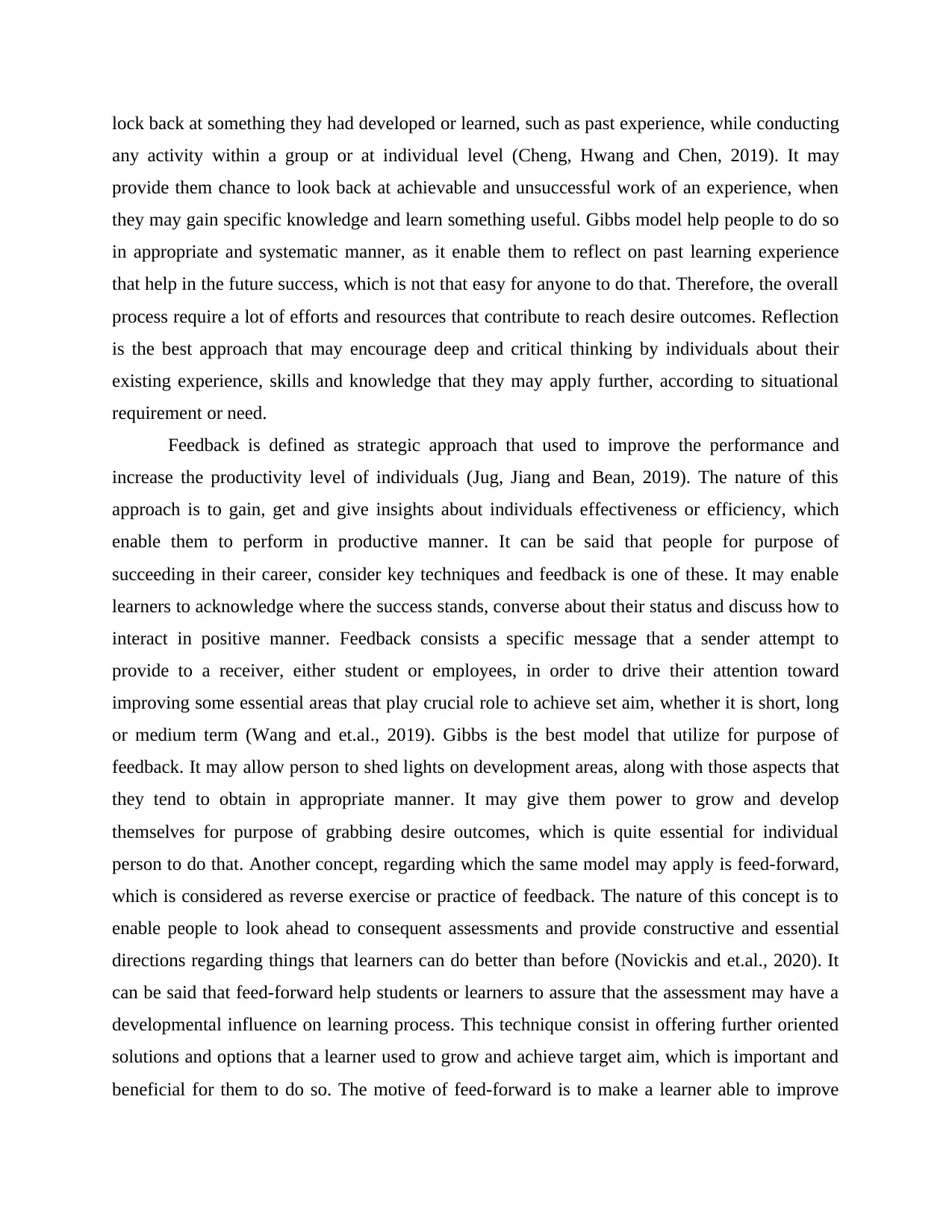
lock back at something they had developed or learned, such as past experience, while conducting
any activity within a group or at individual level (Cheng, Hwang and Chen, 2019). It may
provide them chance to look back at achievable and unsuccessful work of an experience, when
they may gain specific knowledge and learn something useful. Gibbs model help people to do so
in appropriate and systematic manner, as it enable them to reflect on past learning experience
that help in the future success, which is not that easy for anyone to do that. Therefore, the overall
process require a lot of efforts and resources that contribute to reach desire outcomes. Reflection
is the best approach that may encourage deep and critical thinking by individuals about their
existing experience, skills and knowledge that they may apply further, according to situational
requirement or need.
Feedback is defined as strategic approach that used to improve the performance and
increase the productivity level of individuals (Jug, Jiang and Bean, 2019). The nature of this
approach is to gain, get and give insights about individuals effectiveness or efficiency, which
enable them to perform in productive manner. It can be said that people for purpose of
succeeding in their career, consider key techniques and feedback is one of these. It may enable
learners to acknowledge where the success stands, converse about their status and discuss how to
interact in positive manner. Feedback consists a specific message that a sender attempt to
provide to a receiver, either student or employees, in order to drive their attention toward
improving some essential areas that play crucial role to achieve set aim, whether it is short, long
or medium term (Wang and et.al., 2019). Gibbs is the best model that utilize for purpose of
feedback. It may allow person to shed lights on development areas, along with those aspects that
they tend to obtain in appropriate manner. It may give them power to grow and develop
themselves for purpose of grabbing desire outcomes, which is quite essential for individual
person to do that. Another concept, regarding which the same model may apply is feed-forward,
which is considered as reverse exercise or practice of feedback. The nature of this concept is to
enable people to look ahead to consequent assessments and provide constructive and essential
directions regarding things that learners can do better than before (Novickis and et.al., 2020). It
can be said that feed-forward help students or learners to assure that the assessment may have a
developmental influence on learning process. This technique consist in offering further oriented
solutions and options that a learner used to grow and achieve target aim, which is important and
beneficial for them to do so. The motive of feed-forward is to make a learner able to improve
any activity within a group or at individual level (Cheng, Hwang and Chen, 2019). It may
provide them chance to look back at achievable and unsuccessful work of an experience, when
they may gain specific knowledge and learn something useful. Gibbs model help people to do so
in appropriate and systematic manner, as it enable them to reflect on past learning experience
that help in the future success, which is not that easy for anyone to do that. Therefore, the overall
process require a lot of efforts and resources that contribute to reach desire outcomes. Reflection
is the best approach that may encourage deep and critical thinking by individuals about their
existing experience, skills and knowledge that they may apply further, according to situational
requirement or need.
Feedback is defined as strategic approach that used to improve the performance and
increase the productivity level of individuals (Jug, Jiang and Bean, 2019). The nature of this
approach is to gain, get and give insights about individuals effectiveness or efficiency, which
enable them to perform in productive manner. It can be said that people for purpose of
succeeding in their career, consider key techniques and feedback is one of these. It may enable
learners to acknowledge where the success stands, converse about their status and discuss how to
interact in positive manner. Feedback consists a specific message that a sender attempt to
provide to a receiver, either student or employees, in order to drive their attention toward
improving some essential areas that play crucial role to achieve set aim, whether it is short, long
or medium term (Wang and et.al., 2019). Gibbs is the best model that utilize for purpose of
feedback. It may allow person to shed lights on development areas, along with those aspects that
they tend to obtain in appropriate manner. It may give them power to grow and develop
themselves for purpose of grabbing desire outcomes, which is quite essential for individual
person to do that. Another concept, regarding which the same model may apply is feed-forward,
which is considered as reverse exercise or practice of feedback. The nature of this concept is to
enable people to look ahead to consequent assessments and provide constructive and essential
directions regarding things that learners can do better than before (Novickis and et.al., 2020). It
can be said that feed-forward help students or learners to assure that the assessment may have a
developmental influence on learning process. This technique consist in offering further oriented
solutions and options that a learner used to grow and achieve target aim, which is important and
beneficial for them to do so. The motive of feed-forward is to make a learner able to improve
Paraphrase This Document
Need a fresh take? Get an instant paraphrase of this document with our AI Paraphraser
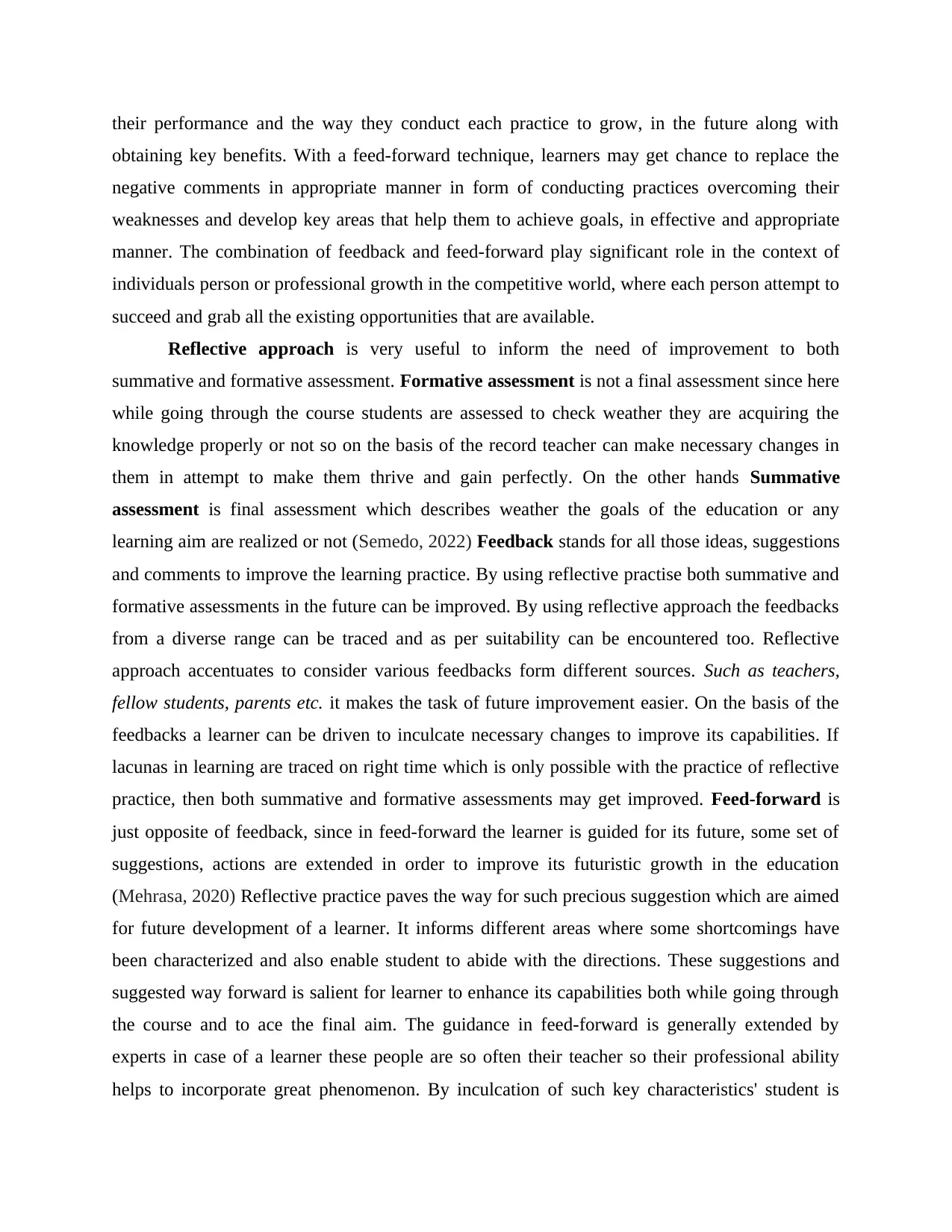
their performance and the way they conduct each practice to grow, in the future along with
obtaining key benefits. With a feed-forward technique, learners may get chance to replace the
negative comments in appropriate manner in form of conducting practices overcoming their
weaknesses and develop key areas that help them to achieve goals, in effective and appropriate
manner. The combination of feedback and feed-forward play significant role in the context of
individuals person or professional growth in the competitive world, where each person attempt to
succeed and grab all the existing opportunities that are available.
Reflective approach is very useful to inform the need of improvement to both
summative and formative assessment. Formative assessment is not a final assessment since here
while going through the course students are assessed to check weather they are acquiring the
knowledge properly or not so on the basis of the record teacher can make necessary changes in
them in attempt to make them thrive and gain perfectly. On the other hands Summative
assessment is final assessment which describes weather the goals of the education or any
learning aim are realized or not (Semedo, 2022) Feedback stands for all those ideas, suggestions
and comments to improve the learning practice. By using reflective practise both summative and
formative assessments in the future can be improved. By using reflective approach the feedbacks
from a diverse range can be traced and as per suitability can be encountered too. Reflective
approach accentuates to consider various feedbacks form different sources. Such as teachers,
fellow students, parents etc. it makes the task of future improvement easier. On the basis of the
feedbacks a learner can be driven to inculcate necessary changes to improve its capabilities. If
lacunas in learning are traced on right time which is only possible with the practice of reflective
practice, then both summative and formative assessments may get improved. Feed-forward is
just opposite of feedback, since in feed-forward the learner is guided for its future, some set of
suggestions, actions are extended in order to improve its futuristic growth in the education
(Mehrasa, 2020) Reflective practice paves the way for such precious suggestion which are aimed
for future development of a learner. It informs different areas where some shortcomings have
been characterized and also enable student to abide with the directions. These suggestions and
suggested way forward is salient for learner to enhance its capabilities both while going through
the course and to ace the final aim. The guidance in feed-forward is generally extended by
experts in case of a learner these people are so often their teacher so their professional ability
helps to incorporate great phenomenon. By inculcation of such key characteristics' student is
obtaining key benefits. With a feed-forward technique, learners may get chance to replace the
negative comments in appropriate manner in form of conducting practices overcoming their
weaknesses and develop key areas that help them to achieve goals, in effective and appropriate
manner. The combination of feedback and feed-forward play significant role in the context of
individuals person or professional growth in the competitive world, where each person attempt to
succeed and grab all the existing opportunities that are available.
Reflective approach is very useful to inform the need of improvement to both
summative and formative assessment. Formative assessment is not a final assessment since here
while going through the course students are assessed to check weather they are acquiring the
knowledge properly or not so on the basis of the record teacher can make necessary changes in
them in attempt to make them thrive and gain perfectly. On the other hands Summative
assessment is final assessment which describes weather the goals of the education or any
learning aim are realized or not (Semedo, 2022) Feedback stands for all those ideas, suggestions
and comments to improve the learning practice. By using reflective practise both summative and
formative assessments in the future can be improved. By using reflective approach the feedbacks
from a diverse range can be traced and as per suitability can be encountered too. Reflective
approach accentuates to consider various feedbacks form different sources. Such as teachers,
fellow students, parents etc. it makes the task of future improvement easier. On the basis of the
feedbacks a learner can be driven to inculcate necessary changes to improve its capabilities. If
lacunas in learning are traced on right time which is only possible with the practice of reflective
practice, then both summative and formative assessments may get improved. Feed-forward is
just opposite of feedback, since in feed-forward the learner is guided for its future, some set of
suggestions, actions are extended in order to improve its futuristic growth in the education
(Mehrasa, 2020) Reflective practice paves the way for such precious suggestion which are aimed
for future development of a learner. It informs different areas where some shortcomings have
been characterized and also enable student to abide with the directions. These suggestions and
suggested way forward is salient for learner to enhance its capabilities both while going through
the course and to ace the final aim. The guidance in feed-forward is generally extended by
experts in case of a learner these people are so often their teacher so their professional ability
helps to incorporate great phenomenon. By inculcation of such key characteristics' student is
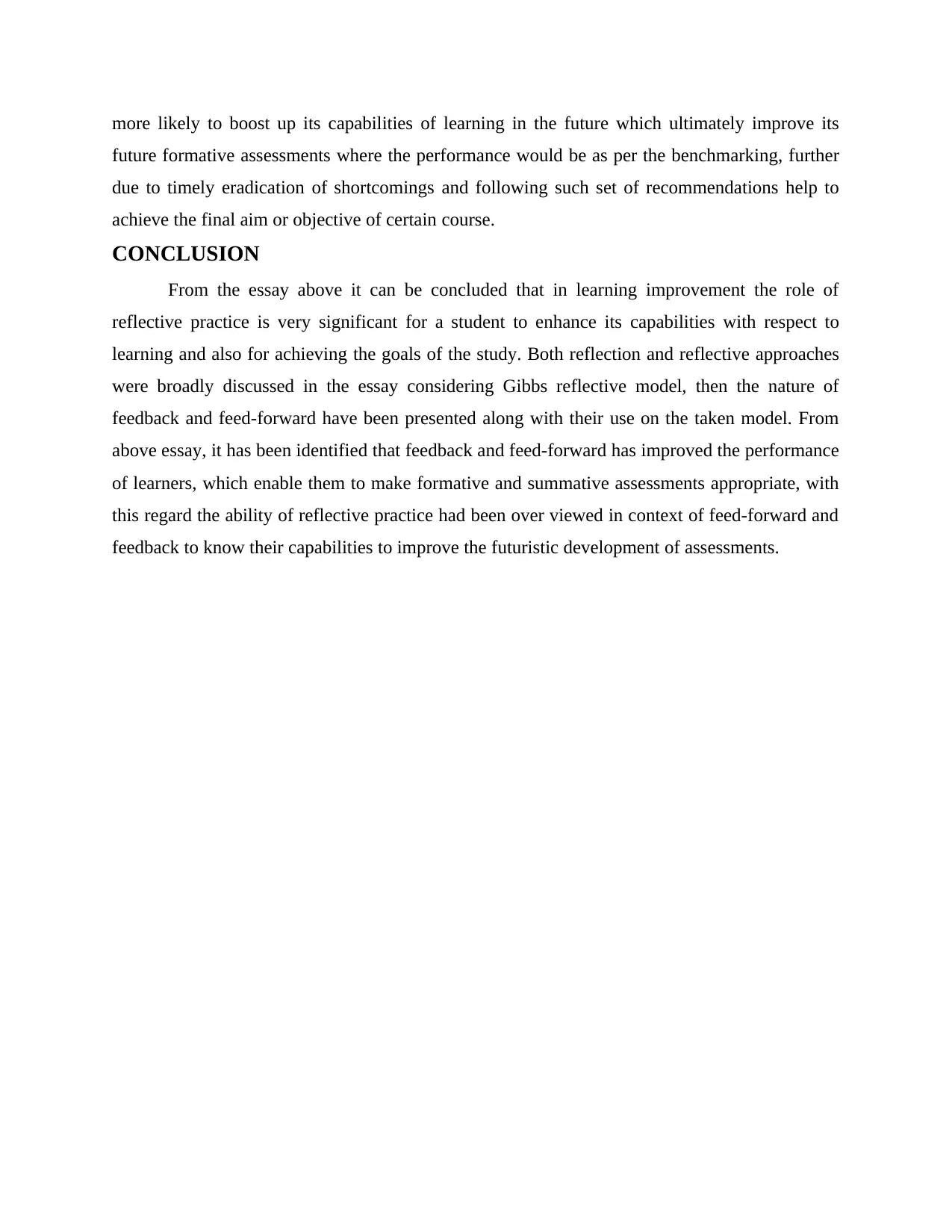
more likely to boost up its capabilities of learning in the future which ultimately improve its
future formative assessments where the performance would be as per the benchmarking, further
due to timely eradication of shortcomings and following such set of recommendations help to
achieve the final aim or objective of certain course.
CONCLUSION
From the essay above it can be concluded that in learning improvement the role of
reflective practice is very significant for a student to enhance its capabilities with respect to
learning and also for achieving the goals of the study. Both reflection and reflective approaches
were broadly discussed in the essay considering Gibbs reflective model, then the nature of
feedback and feed-forward have been presented along with their use on the taken model. From
above essay, it has been identified that feedback and feed-forward has improved the performance
of learners, which enable them to make formative and summative assessments appropriate, with
this regard the ability of reflective practice had been over viewed in context of feed-forward and
feedback to know their capabilities to improve the futuristic development of assessments.
future formative assessments where the performance would be as per the benchmarking, further
due to timely eradication of shortcomings and following such set of recommendations help to
achieve the final aim or objective of certain course.
CONCLUSION
From the essay above it can be concluded that in learning improvement the role of
reflective practice is very significant for a student to enhance its capabilities with respect to
learning and also for achieving the goals of the study. Both reflection and reflective approaches
were broadly discussed in the essay considering Gibbs reflective model, then the nature of
feedback and feed-forward have been presented along with their use on the taken model. From
above essay, it has been identified that feedback and feed-forward has improved the performance
of learners, which enable them to make formative and summative assessments appropriate, with
this regard the ability of reflective practice had been over viewed in context of feed-forward and
feedback to know their capabilities to improve the futuristic development of assessments.
⊘ This is a preview!⊘
Do you want full access?
Subscribe today to unlock all pages.

Trusted by 1+ million students worldwide

Paraphrase This Document
Need a fresh take? Get an instant paraphrase of this document with our AI Paraphraser
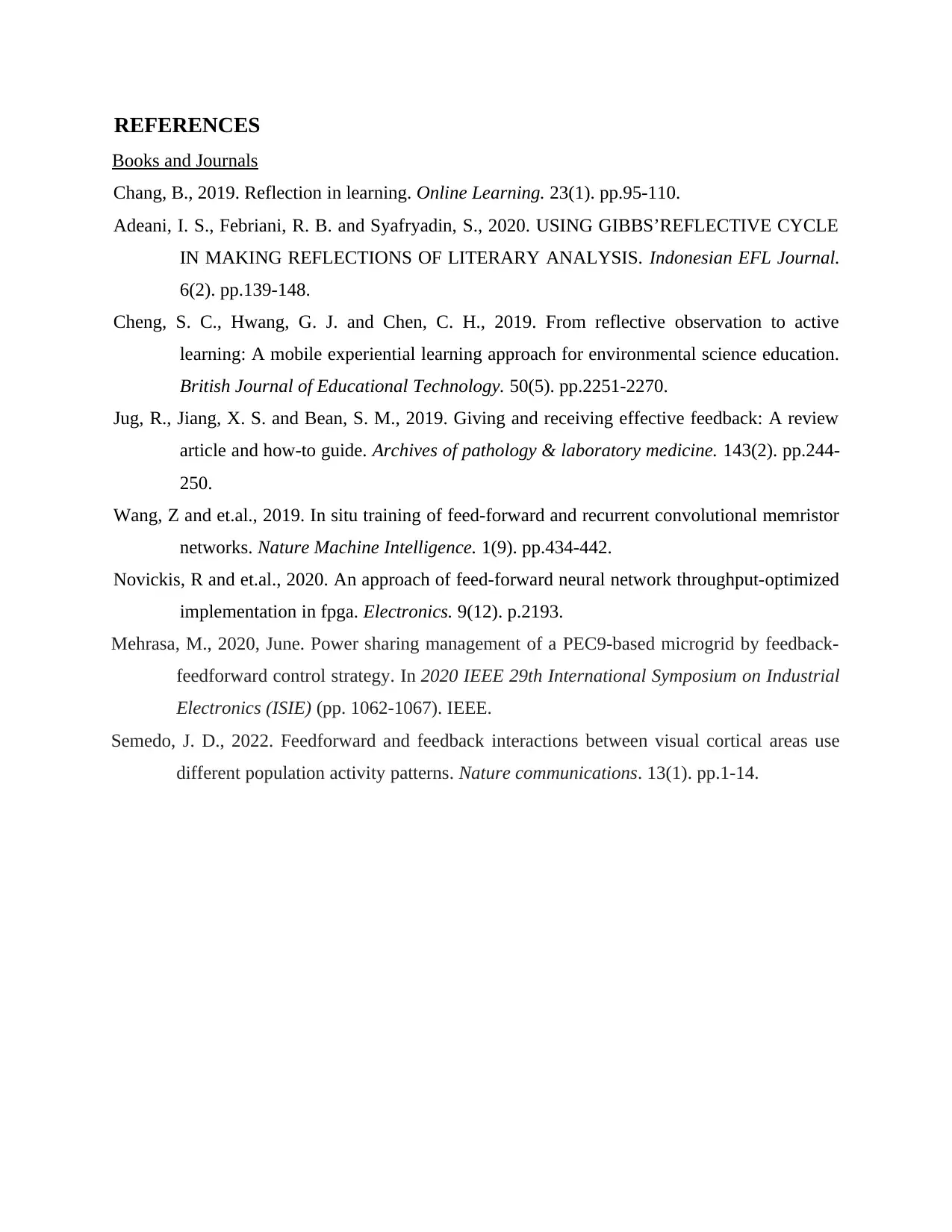
REFERENCES
Books and Journals
Chang, B., 2019. Reflection in learning. Online Learning. 23(1). pp.95-110.
Adeani, I. S., Febriani, R. B. and Syafryadin, S., 2020. USING GIBBS’REFLECTIVE CYCLE
IN MAKING REFLECTIONS OF LITERARY ANALYSIS. Indonesian EFL Journal.
6(2). pp.139-148.
Cheng, S. C., Hwang, G. J. and Chen, C. H., 2019. From reflective observation to active
learning: A mobile experiential learning approach for environmental science education.
British Journal of Educational Technology. 50(5). pp.2251-2270.
Jug, R., Jiang, X. S. and Bean, S. M., 2019. Giving and receiving effective feedback: A review
article and how-to guide. Archives of pathology & laboratory medicine. 143(2). pp.244-
250.
Wang, Z and et.al., 2019. In situ training of feed-forward and recurrent convolutional memristor
networks. Nature Machine Intelligence. 1(9). pp.434-442.
Novickis, R and et.al., 2020. An approach of feed-forward neural network throughput-optimized
implementation in fpga. Electronics. 9(12). p.2193.
Mehrasa, M., 2020, June. Power sharing management of a PEC9-based microgrid by feedback-
feedforward control strategy. In 2020 IEEE 29th International Symposium on Industrial
Electronics (ISIE) (pp. 1062-1067). IEEE.
Semedo, J. D., 2022. Feedforward and feedback interactions between visual cortical areas use
different population activity patterns. Nature communications. 13(1). pp.1-14.
Books and Journals
Chang, B., 2019. Reflection in learning. Online Learning. 23(1). pp.95-110.
Adeani, I. S., Febriani, R. B. and Syafryadin, S., 2020. USING GIBBS’REFLECTIVE CYCLE
IN MAKING REFLECTIONS OF LITERARY ANALYSIS. Indonesian EFL Journal.
6(2). pp.139-148.
Cheng, S. C., Hwang, G. J. and Chen, C. H., 2019. From reflective observation to active
learning: A mobile experiential learning approach for environmental science education.
British Journal of Educational Technology. 50(5). pp.2251-2270.
Jug, R., Jiang, X. S. and Bean, S. M., 2019. Giving and receiving effective feedback: A review
article and how-to guide. Archives of pathology & laboratory medicine. 143(2). pp.244-
250.
Wang, Z and et.al., 2019. In situ training of feed-forward and recurrent convolutional memristor
networks. Nature Machine Intelligence. 1(9). pp.434-442.
Novickis, R and et.al., 2020. An approach of feed-forward neural network throughput-optimized
implementation in fpga. Electronics. 9(12). p.2193.
Mehrasa, M., 2020, June. Power sharing management of a PEC9-based microgrid by feedback-
feedforward control strategy. In 2020 IEEE 29th International Symposium on Industrial
Electronics (ISIE) (pp. 1062-1067). IEEE.
Semedo, J. D., 2022. Feedforward and feedback interactions between visual cortical areas use
different population activity patterns. Nature communications. 13(1). pp.1-14.

9
⊘ This is a preview!⊘
Do you want full access?
Subscribe today to unlock all pages.

Trusted by 1+ million students worldwide
1 out of 9
Related Documents
Your All-in-One AI-Powered Toolkit for Academic Success.
+13062052269
info@desklib.com
Available 24*7 on WhatsApp / Email
![[object Object]](/_next/static/media/star-bottom.7253800d.svg)
Unlock your academic potential
Copyright © 2020–2026 A2Z Services. All Rights Reserved. Developed and managed by ZUCOL.



